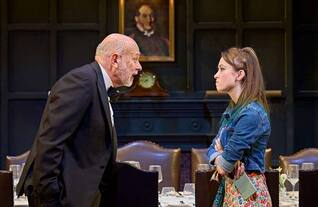Ruth Leon … Pocket Review
Ruth Leon recommendsThe Snail House – Hampstead Theatre
I don’t know what to tell you about The Snail House. My mother told me that if you can’t say anything nice about something it’s better to say nothing at all and I’m tempted to say nothing at all. But that’s a cop out.
The play, a family drama about generational conflict and parental hubris, is the first original play by Richard Eyre, former Director of the National Theatre. His directing, writing and adaptation credits, in very small type, fill an entire page of the printed play. He’s a Knight of the Realm and a Companion of Honour. He’s a very big deal indeed in my world. I admire him tremendously. He’s also a thoroughly nice man. I expected a meaty new play with lots to think about. Why? Because he’s Richard Eyre. He’s the man who knows what makes a good play and how to direct it.
But the truth is, and I don’t know any other way to say this, The Snail House simply doesn’t work. It is shapeless and flabby, with arguments that meander everywhere but don’t go anywhere, dialogue that states its points too loosely and decreasingly effectively, and characters who have nowhere to grow within the play and are left to repeat their various complaints against the central character ever more emphatically. And this great director, and he is a great director, makes staging mistakes that any directing student would recognise early in the rehearsal process and eliminate.
The bare bones of The Snail House are these: a famous doctor who has covered himself with public glory during the pandemic has been knighted for his services. He’s giving himself a party to celebrate his success and his birthday. His family is less than enthusiastic about the party or about him. His long-suffering wife (the best written character with the least to do in a fine performance from Eva Pope), his smarmy son, and his snarky, half-baked daughter all have their own grievances as does the catering manager, (a well-thought out performance from Amanda Bright).
The first act is mainly comprised of family arguments while the catering staff endlessly set the table before dinner. The second is more family arguments while the staff endlessly dismantle the table after dinner. The party happens off-stage.
It seems to me that Richard Eyre had about six different plays he wanted to write and he introduces all their topics during the course of the evening. Unfortunately, he doesn’t develop any of them and they are left to drop onto the stage like so many used tissues. The only significant event happens in the last ten minutes and is a completely separate plot which has nothing to do with the family or their various agendas.
My mother was right.






Comments